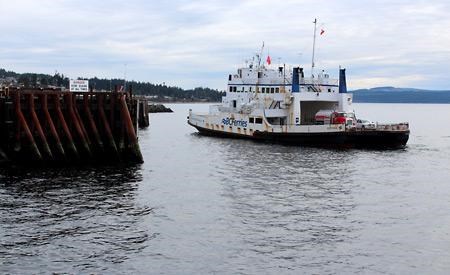According to the provincial government, it has all the information it needs to make service reductions on ferry routes, but critics say that will only make problems with BC Ferries worse.
Transportation Minister Mary Polak released the Coastal Ferries Consultation and Engagement report on Tuesday, March 5, which summarized public input following eight weeks of meetings last fall to gather input on how to find $26-million in savings for BC Ferries by 2016, as well as long-term solutions to keep the system viable.
The consultation process included 40 public meetings in 30 communities that were attended by more than 2,000 people, and produced almost 2,000 written submissions and feedback forms.
Polak said reductions must be made. “We know that there are reductions and changes to service that need to be made,” she said during a conference call with reporters.
When asked about high fares, Polak said the message from the consultation was “loud and clear,” adding maintaining affordability was a concern for her government as well. “The challenge, of course, facing us or facing any future government, is how do you maintain affordability for the public while at the same time balancing that against the need for basic service levels and protection of the general taxpayer who is currently funding BC Ferries annually to the tune of around $180 million?”
The government could have made the choice to take the utilization, ridership and cost numbers it released as part of the consultation to make decisions on a purely economic basis in terms of BC Ferries’ bottom line, Polak said. The information from the consultation process will ensure that the government is considering the social needs of communities, including their economic viability, she added. “We will now be returning to communities to discuss how we will implement and make determinations on service changes using the results of this consultation as part of the lens through which we view the numbers.”
Bill Cripps, chair of the Northern Sunshine Coast Ferry Advisory Committee, said the report provides no direction. “It doesn’t lead anywhere,” he said. “From that perspective, it’s just a total waste of money and ferry user time.”
However, Cripps said, he thought there was some value in the consultation because it was done by the ministry of transportation and infrastructure. “They heard first hand what the community’s concerns are with respect to the ferry system as it exists today.”
High fares are causing significant socio-economic harm, Cripps added. “They’re destroying the fabric and economic health of our communities. They heard that in spades, not just from Powell River; they heard that everywhere.”
Another main message from the consultation was that ferries should be treated like the highway system in BC and it should be recognized as an essential, affordable transportation system for coastal communities, Cripps added.
While the ministry has said that more consultation will take place before any service reductions are implemented, that “flies in the face of the drop-dead date on agreed service reductions of June 30, 2013 in the coastal ferries service contract,” Cripps said. “Meanwhile, we’re sitting here with a system that’s not working, traffic is continuing to fall and fares, as of April 1, are continuing to rise. It’s just going to get worse.”
The province needs to recognize that the problem is much bigger than finding $26 million in cost savings, he added. “Knee-jerk decisions to cut service will likely make the problem worse, not better. The only way to fix it is start from the ground up, re-evaluate coastal community transportation needs and re-work the system to meet those needs. It has to include affordable fares. That’s the process that needs to take place.”
Colin Palmer, Powell River Regional District board chair and the head of a group of regional district chairs who are concerned about BC Ferries, said the report confirms what the ferry commissioner said in his report and what the regional district chairs have been saying. “Now everybody in the province who was involved in this survey are pretty well all saying the same thing,” he said.
The regional district chairs were planning to meet with government representatives as well as New Democratic Party (NDP) representatives yesterday, Palmer said, to find out where it was all going. “People are saying basically, we’ve had enough. Fares have to come down somehow. The subsidy from the provincial government is 17.8 per cent, which is not good enough. The whole thing is spiralling down.”
MLA Maurine Karagianis, the NDP ferries critic who lived in Powell River for 12 years in the 1970s and early 1980s, said the consultation report was more a public relations exercise for the BC Liberals than it was a fact-finding mission. “Any of us who live on the coast know that BC Ferries is a pretty significant part of our transportation infrastructure,” she said.
Privatizing BC Ferries has been a failure for all ferry-dependent communities, Karagianis said. However, she stopped short of promising that if the NDP forms government after the May election it would return BC Ferries to a Crown corporation, saying that wouldn’t solve the problems.
Karagianis had some suggestions for running a smarter ferry system, such as converting to natural gas for fuel, eliminating “fancy frills” and returning to stable, affordable service. She also questioned if an “expensive tourism destination office in downtown Vancouver” was necessary.
The NDP hasn’t seen BC Ferries’ books, Karagianis said, and the Liberals’ 2013 budget is not real. Until the party knows the true state of the budget, Karagianis added, the NDP can’t make a commitment. “I know how desperate coastal communities are for some assurance that ferry fares will change,” she said. “It would be unrealistic for us to say what we can do until we know more about the true state of the company and the true state of the budget.”



